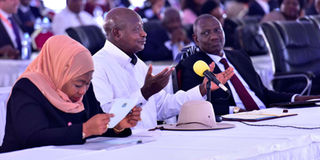East Africa firms push for review of barriers

Presidents Samia Suluhu (Tanzania), Yoweri Museveni Museveni (Uganda) and William Ruto (Kenya) during the Africa Now Summit on March 12, 2019. Businesses within East Africa have urged governments in the region to address key challenges cross-border traders face, which they say will impede exports to the new African Continental Free Trade Area (AfCFTA).
Businesses within East Africa have urged governments in the region to address key challenges cross-border traders face, which they say will impede exports to the new African Continental Free Trade Area (AfCFTA).
The businesses observed that while the AfCFTA relies on working regional economic blocs such as the East African Community (EAC) market for proper implementation, traders still face hurdles within the regional bloc.
Drawn from different East African countries under the East African Business Council (EABC), business leaders observed that the region has a huge advantage to reap from the AfCFTA, having three out of the eight countries participating in the guided trade initiative- a pilot programme to test the viability of AfCFTA.
“We need that deliberate government commitment, the manufacturers, the traders are committed, but we need that to be complemented and supported by governments in terms of promoting supporting and nurturing industries,” said EABC CEO John Kalisa.
The businesses complain about non-tariff barriers, including border controls that frustrate trade, which a World Bank report also indicated are likely to be the biggest barrier to free trade in Africa.
The Kenya Private Sector Alliance said there are efforts to review policies that currently hinder Kenyan traders from accessing the new market, due to impediments the country had placed on businesses outside its trading blocs.
“We have a lot of national policies and domestic laws which we need to scan and ensure that they are aligned with our commitments at the region,” said Kepsa deputy chief executive Victor Ogalo.





